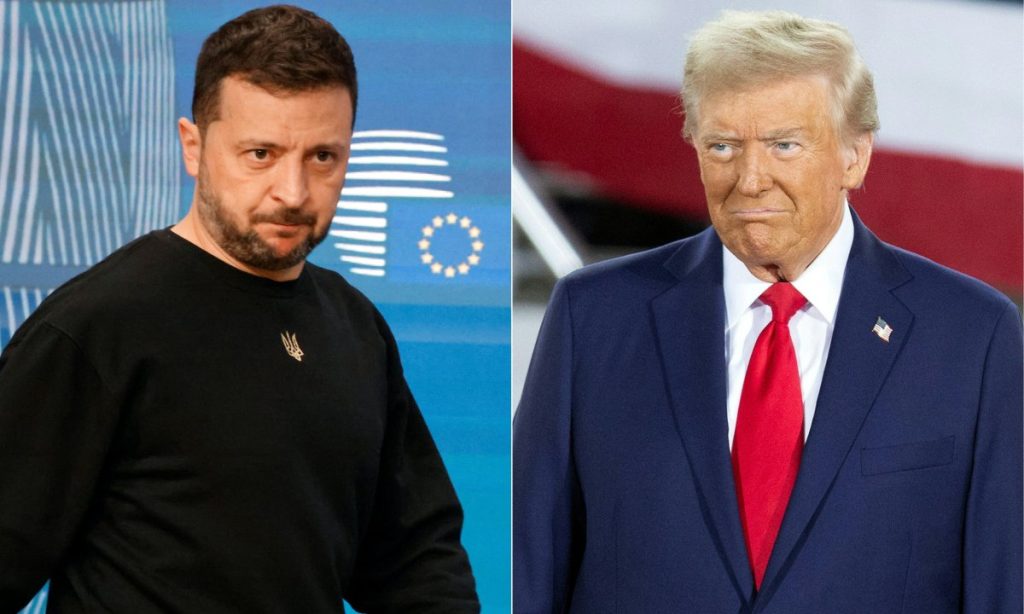
Ukrainian President Volodymyr Zelensky has expressed confidence that the war with Russia would “end sooner” if Donald Trump were to become U.S. president again. In a recent interview, Zelensky highlighted a “constructive exchange” he had with Trump following the latter’s victory in the U.S. presidential election, though he refrained from disclosing specifics about any demands made by Trump regarding talks with Russia. Notably, Zelensky mentioned that nothing Trump said contradicted Ukraine’s stance on the conflict.
Trump has repeatedly stated that his primary goal is to bring the war, which began with Russia’s invasion of Ukraine in February 2022, to an end quickly. He has also expressed concerns about the financial burden the war has placed on U.S. resources, particularly in the form of military aid to Ukraine. In fact, the U.S. has been the largest supplier of arms to Ukraine, with $55.5 billion in military aid committed between the start of the war and June 2024, according to the Kiel Institute for the World Economy.
Despite these significant contributions, support for continued military aid among U.S. voters, particularly Republicans, has waned. During his campaign for the 2024 election, Trump has made bold promises to resolve the conflict swiftly, even claiming he could end the war in a day. However, Trump has yet to clarify the specifics of how he would accomplish such a feat.
Zelensky, in his interview with Ukrainian media outlet Suspilne, was confident that under a Trump administration, the war could be resolved more quickly. “It is certain that the war will end sooner with the policies of the team that will now lead the White House,” Zelensky stated, referring to Trump’s promised approach. He added that Ukraine would continue to work towards a diplomatic resolution, emphasizing the need to end the war next year, especially as Russian forces continue to advance on the battlefield.
Since Ukraine’s counteroffensive in 2023 failed to produce the significant territorial gains it had hoped for, the front lines of the war have largely stalled. Russian forces remain entrenched in the east and southeast of Ukraine, with intense fighting still concentrated in the eastern Donbas region. On Friday, the Institute for the Study of War (ISW), a U.S.-based think tank, reported incremental Russian advances along the front line, particularly near the northeastern city of Kupyansk and the southeastern town of Vuhledar.
In an attempt to disrupt Russian advances, Ukraine launched a rare offensive into Russian territory over the summer, targeting Russia’s Kursk region. This marked the first time Ukrainian forces had occupied Russian land since World War II. Zelensky stated that the operation’s goal was to divert Russian troops away from the Ukrainian front lines, although the success of this strategy remains unclear. Ukraine’s relatively smaller military has been bolstered by advanced Western weaponry, while Russia has drawn on large numbers of conscripts to strengthen its forces.
Despite the ongoing military stalemate, Zelensky’s “victory plan” revealed last month includes the continuation of offensive actions aimed at avoiding the creation of “buffer zones” in Ukraine. The war has prompted increased concerns about fatigue, both within Ukraine and internationally, leading to a renewed focus on a potential diplomatic resolution. However, Zelensky has been firm in his refusal to concede any Ukrainian territory, including Crimea, which has been under Russian occupation since 2014.
Zelensky’s comments also come amid growing international debate over how best to resolve the conflict. Trump and Zelensky’s relationship has been complicated. In 2019, Trump was impeached over accusations that he pressured Zelensky to investigate the family of U.S. President Joe Biden. Despite this, Trump has maintained that he has a strong personal rapport with Zelensky. In their most recent meeting in New York, Trump claimed that he would be able to resolve the war “very quickly.”
Critics of Trump, particularly among his Democratic opponents, accuse him of being too sympathetic to Russian President Vladimir Putin, suggesting that his approach to the war would effectively lead to Ukraine’s surrender, threatening the stability of Europe. There were also reports this week that Trump spoke with Putin shortly after his election win, with some suggesting that he had warned against escalating the conflict further, though the Kremlin denied these claims.
German Chancellor Olaf Scholz, who spoke with Trump after the election, described the incoming U.S. president as having a “more nuanced” stance on the war than many people believe. Scholz also faced criticism from Zelensky for his own recent phone call with Putin—the first conversation between the two leaders in nearly two years. While Scholz’s office said the call reiterated Germany’s position on ending the war, Zelensky argued that it undermined Russia’s isolation and provided Putin with a platform to advance his narrative.
As the war continues, both Ukraine and its international allies remain focused on finding a path to peace, but Zelensky has made it clear that any settlement that involves concessions of Ukrainian land, particularly Crimea, is unacceptable.








